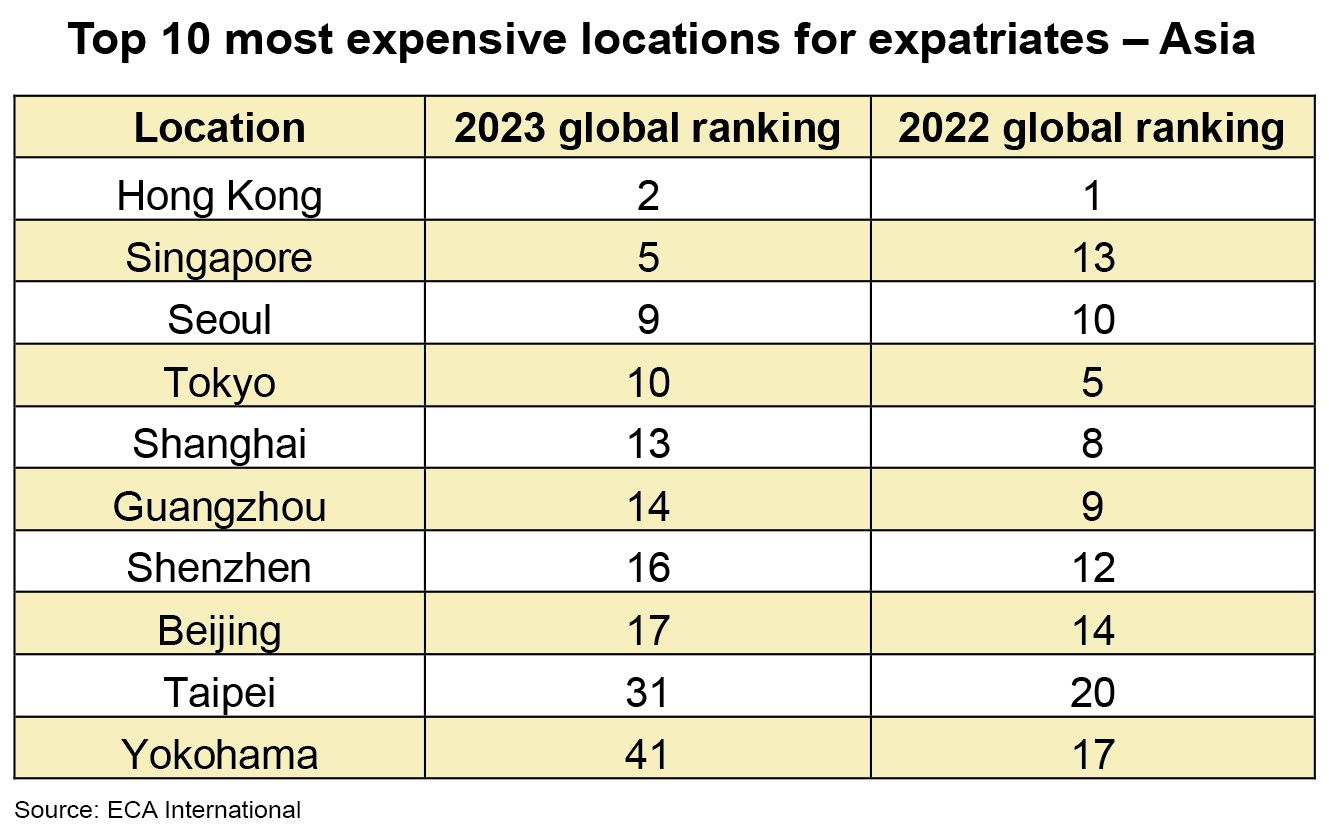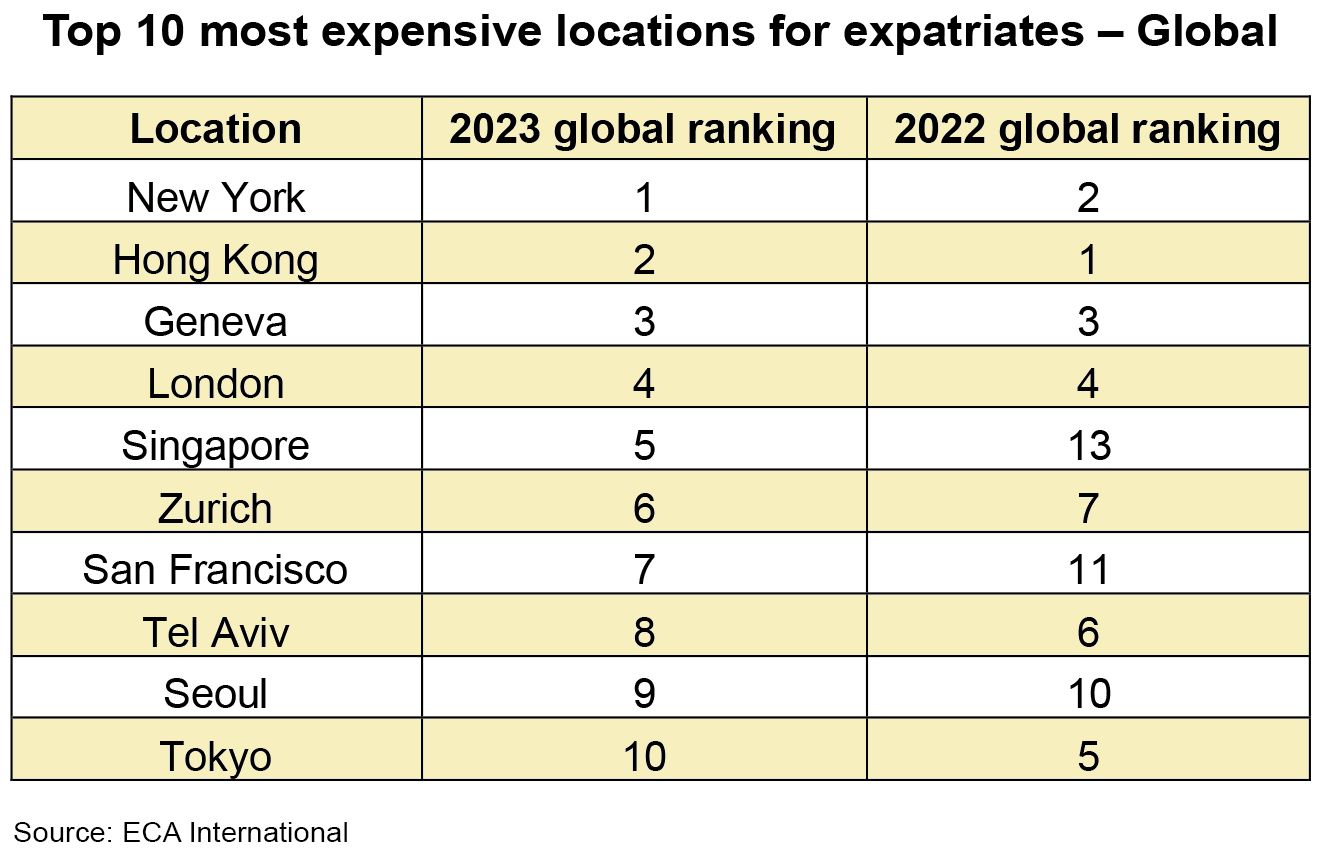Despite historically high rates of inflation, Hong Kong has lost its status as the world’s most expensive city, falling one place to be surpassed by New York, the latest rankings show.
Singapore has climbed eight places to become the fifth most costly location globally, while Seoul has climbed one rung higher to secure the ninth position.
The shift marks the end of Hong Kong's four-year stay at the top as accommodation costs continued to fall in “Asia’s world city” and prices rose at a faster rate in New York, according to the latest cost-of-living research published by expatriate management firm ECA International.
“Costs for goods and services in Hong Kong rose at multi-year highs, showing that the city was not spared from the wave of inflation we have seen throughout the world in the past year,” says Lee Quane, regional director, Asia, at ECA International. “In spite of this, Hong Kong fell in our rankings as the increase in prices of day-to-day goods and services was tempered by falls in accommodation costs in the city.”

Asia highlights
Hong Kong’s fall to second place was matched by nearly all major locations in the region. Singapore, Seoul and Yangon were among the exceptions.
The ranking upgrades of Singapore and Seoul were primarily driven by rapidly rising accommodation costs, albeit for different reasons. Rents in Singapore rose significantly in 2022 as supply did not keep pace with rises in demand. On the other hand, housing costs in Seoul rose largely due to a reduction in supply arising from changes in property tax regulations.
“The fall of many Asian locations in our rankings is partly due to lower rates of inflation relative to other regions included in our research,” says Quane. “However, some locations bucked this trend. Singapore and Seoul’s rise was due largely to major increases in accommodation costs whereas Yangon’s rise was due to ongoing socio-political issues causing significant inflation for day-to-day goods and services.”
Chinese cities have fallen in the rankings due to the impact of a weaker yuan and lower rates of inflation compared to other countries. Shanghai and Guangzhou, while retaining their status as the most expensive cities in China, have fallen out of the global top 10 and now rank as the 13th and 14th most expensive cities in the world.
“China’s relatively late emergence from Covid-related restrictions had an impact on its economy,” explains Quane. “Its currency is weaker against the US dollar than it was last year, making its cities relatively cheaper while inflation rates have been lower than in many other locations in the world.”
Cities in Taiwan have also seen double-digit drops in rankings, with Taipei sliding 11 places to the 31st spot globally. Similarly, Japanese cities have witnessed significant falls in the rankings as currency depreciation counteracted inflation rates that are at multi-year highs. Tokyo, which was consistently among the top five globally in the past five years, has dropped five places to 10th.
“Tokyo’s fall in our rankings relatively makes it a cheaper location in comparison to recent years,” notes Quane. “However, for companies moving staff from Japan, the result of Japanese cities’ fall in our rankings owing to a weaker currency means that companies may have to pay more in order to ensure that their employees’ purchasing power is protected while they are overseas.”

Global highlights
Rankings for all US cities have risen, driven by the strength of the US dollar and high inflation. New York has overtaken Hong Kong as the world’s most expensive location for expatriates due to significant rises in rental costs as demand soared post-pandemic.
Trends among European capitals have been mixed. Geneva and London maintained their positions as the third and fourth most expensive locations in the world. Norwegian and Swedish cities plummeted in the rankings by an average of 10 places as their currencies weakened while nearly two-thirds of the locations in the eurozone have risen in the rankings.
France is one of the exceptions; all the surveyed French cities have fallen in the rankings as they have seen marginally lower inflation than many other cities using the euro.
The Russian invasion of Ukraine continues to impact the cost of living in the warring countries, the wider region and around the world. Despite Western sanctions, the Russian rouble rebounded in the past year, pushing Moscow up 37 places to become the 25th most expensive location in the world.
Accommodation costs have surged in locations where many Ukrainian refugees have fled, making them more expensive for everyone including expatriates. Polish cities have seen the biggest impact with massive rises in rents of between 25% and 50%. Krakow was up 23 places in the global rankings to 178th and Warsaw rose 11 places to 158th.
Russians fleeing possible mobilization as a result of the war have also had an impact on several cities, such as Dubai, Yerevan, Nicosia and Tbilisi, among others. Rents in Dubai rose nearly a third, pushing the city up to 12th in the global rankings, while rents also rose by more than a fifth in Tbilisi as supply could not rise to meet the increased demand from Russian expatriates. The Georgian city rose 65 places to 102nd in the rankings as a stronger currency also helped make it more expensive for visitors. However, Istanbul saw the biggest rise in this year’s rankings, up 95 places to 108th. While the city has been impacted by the war, prices have surged by over 80%, mainly due to the economic policies of President Recep Tayyip Erdogan, who was recently re-elected, according to the study.
ECA International has been conducting research into cost of living for 50 years. It carries out two main surveys per year to help companies assess cost of living differences as part of salary calculations for cross-border moves.








